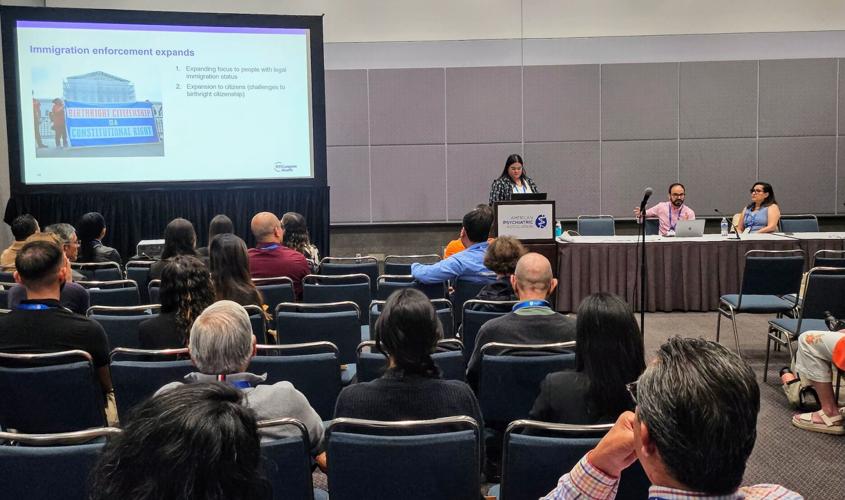Traumatic experiences can be presented in different ways without realizing it in the moment. In the immigration spectrum, the multigenerational emotional distress is felt across the nation with the increase of random detentions, arrests and deportations.

Experts talked about how deportations are affecting people's mental health. (Photo by Jacqueline García)
On Sunday, during the annual meeting of the American Psychiatric Association (APA), clinical instructor Natan Vega-Potler said that the distress of children and parents separation can lead to increased odds of suicidal ideation, alcohol consumption and externalizing behaviors.
Vega-Potler said the things that have been changing beyond deportation detention is immigration enforcement’s effort to increase the capacity to remove people, focusing not only on people at the U.S.-Mexico border, but in the interior of the United States.
Statistics show that as of April 29, 2025, during the first 100 days––of Donald Trump's second presidential term, his administration deported 65,682 undocumented immigrants. According to ICE, three in four arrests were considered criminals. Nearly 10,000 arrests were related to charges for assaults, DUI and/or weapon offenses.
Vega-Potler, who participated in the panel “Healing Across Borders: Supporting the Mental Health of Hispanic Immigrants Through Culturally Relevant Care and Community Collaboration,” said the increase has been happening in part through the 287(g) program. This program allows ICE to delegate state and local law enforcement officers the authority to perform certain immigration officer functions.
“More recently [ICE] is including local agencies like the Florida Fish and Wildlife Conservation Commission or the Florida Department of Financial Services,” said Vega.
Anti-immigrant impact
These adverse experiences, particularly in childhood, increase the risk of mental health disorders such as depression, fractured sense of identity and fear of seeking services. Additionally, there is the possibility of Post-Traumatic Stress Disorder (PTSD) and chronic medical conditions, according to experts.
According to psychiatrist Bárbara Trejo-Ortega, the majority of immigrants being currently targeted are of Latino or Hispanic origin. This leads to racism because people start to associate the idea of racialization with immigration status.
“One thing I’m noticing a lot in the clinic is a lot of questions about the patient’s sense of identity,” she said. “Meaning you start to conflate the identity of being Hispanic or Latino with also being undocumented or having a certain legal status.”
Trejo-Ortega said it is more common to see patients postponing or canceling their appointments, even if it’s with her, who is Latina, due to fear of the outcome of seeking services.

The APA meeting at the LA Convention from May 17-21. (Photo by Jacqueline García)
According to the Pew Research Center, 42% of Latinos are worried that they or someone close could be deported. This number is exponentially higher compared to 19% of Blacks or Asians and 12% of Whites.
Also, 31% of Hispanics are worried about being asked to prove their U.S. citizenship or immigration status compared to 24% Asians, 20% Black and 5% White.
Trejo-Ortega said that the other issue she has seen among her Latino patients is that they start questioning if either them or people that look like them are bad, criminals or a burden to society.
“It makes sense that at some point you begin to internalize this and that’s why the work we do is to try to counter those narratives is so important,” she said.
The recommendations
Nathaly Rubio-Torio, executive director of Voces Latinas in New York, said there must be culturally responsive practices in the clinics. This includes adding promotora models, a culturally responsive space and healing circles and screening for trauma, anxiety and depression.
She said when there are mental health screenings for trauma or depression, over 85% of results are positive for both.
“We just have to make sure in all of our intake processes that we are touching on mental health and when we can measure this, it will help us make the right referrals,” she said.
Experts during the panel said strategies to support the mental health of Hispanic immigrants must consider both material and psychological needs. They also agreed that some challenges must be addressed, including sufficient funding, adequate resources, including Spanish-speaking providers, and leadership in clinics. Also, the possibility to provide virtual access for those who fear deportation/separation and alternate methods of payment for the uninsured.
And equally important is to address the fact that Latinos are not a monolithic group. There are cultural, racial, ethnic, socioeconomic status and experiences that make them such a diverse group.













(0) comments
Welcome to the discussion.
Log In
Keep it Clean. Please avoid obscene, vulgar, lewd, racist or sexually-oriented language.
PLEASE TURN OFF YOUR CAPS LOCK.
Don't Threaten. Threats of harming another person will not be tolerated.
Be Truthful. Don't knowingly lie about anyone or anything.
Be Nice. No racism, sexism or any sort of -ism that is degrading to another person.
Be Proactive. Use the 'Report' link on each comment to let us know of abusive posts.
Share with Us. We'd love to hear eyewitness accounts, the history behind an article.